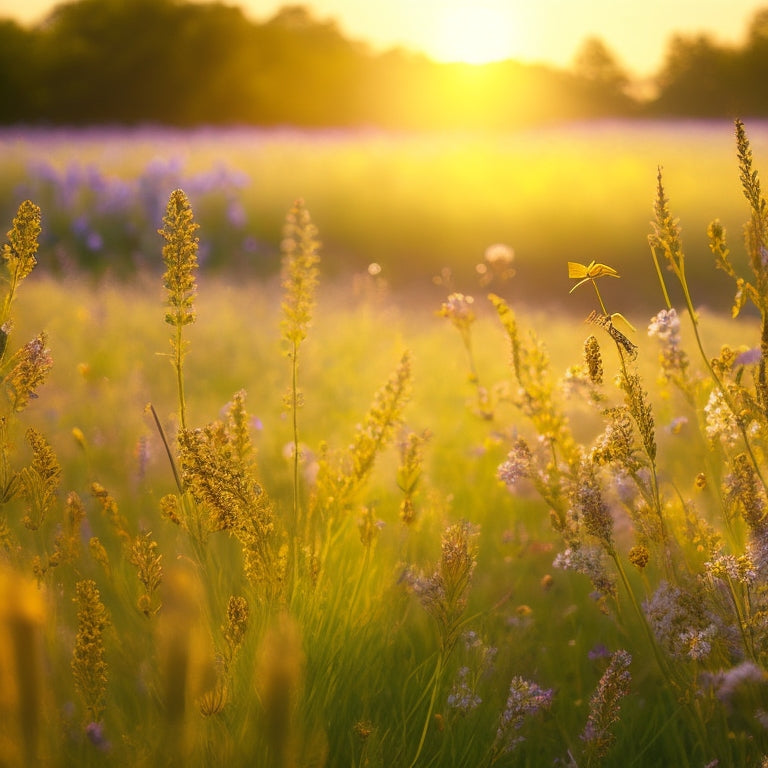
Support Local Bees: Buzz for Conservation
Share
We're taking action to support local bees by adopting conservation practices. We're educating ourselves on beekeeping best practices, buying local honey, and creating bee-friendly habitats in our gardens. By choosing raw honey and avoiding treated plants, we're promoting bee health. We're also advocating for pollinator rights by supporting legislation and businesses that prioritize their protection. Additionally, we're collaborating with others to raise awareness and adopting sustainable practices. As we work together, we'll uncover more effective ways to reverse the alarming decline of bee colonies - and we're just getting started.
Key Takeaways
• Buying local honey supports local beekeepers financially and promotes the local bee economy.
• Creating bee-friendly habitats in gardens and urban spaces helps increase the local bee population.
• Educating oneself and others about bee conservation raises awareness and inspires action to protect local bees.
• Supporting legislative action and pollinator-friendly policies helps create a bee-friendly environment.
• Adopting sustainable practices and reducing environmental impact helps conserve local bee populations.
Beekeeping for Conservation
By maintaining managed hives, we increase the local bee population, providing a crucial boost to ecosystem health and honey production. As responsible beekeepers, we grasp the importance of beekeeper education in ensuring the well-being of our bees. We take classes, join clubs, and seek mentors to stay updated on best practices.
By doing so, we minimize our environmental impact and create a thriving environment for our bees. Managed hives allow us to monitor and control variables, resulting in healthier bees and a stronger bee population. This, in turn, has a positive ripple effect on the ecosystem, supporting biodiversity and ecosystem services.
Supporting Local Beekeepers
As we shop for honey, we're not just sweetening our tea, but also directly impacting the local beekeeping community. It's essential we make informed choices to support these dedicated individuals. By choosing to buy local honey, we're directly contributing to the success of local beekeepers, which in turn benefits bee health.
Here are some ways we can support local beekeepers:
-
Buy local honey: Honey sales are a significant source of income for beekeepers, and by buying local, we're ensuring that our money stays within the community.
-
Opt for bee-friendly products: Look for products that promote bee health, such as raw honey and beeswax candles.
-
Avoid treated plants: Refrain from purchasing plants treated with insecticides, which can harm bees.
- Spread the buzz: Share the importance of supporting local beekeepers with friends and family, and encourage them to make informed choices.
Creating Bee-Friendly Habitats
We can greatly contribute to the well-being of local bees by thoughtfully designing and maintaining our gardens and outdoor spaces to provide them with the resources they need to thrive. By adopting pollinator-friendly landscaping practices, we can create urban bee habitats that mimic their natural environments.
Community gardens are an excellent way to bring people together to create and maintain these habitats. We can incorporate native plants, reduce lawn areas, and minimize pesticide use to create a haven for bees. Natural landscaping techniques, such as xeriscaping, can also help conserve water and reduce maintenance.
Advocating for Pollinator Rights
Minnesotans have a unique opportunity to make a significant impact on pollinator protection through advocacy and policy change. We can advocate for pollinator rights by supporting legislative action that promotes pollinator protection.
Here are some ways we can make a difference:
-
Contact our representatives: Reach out to our local representatives and express our support for pollinator-friendly policies.
-
Participate in community engagement: Engage in discussions with our neighbors and community members about the importance of pollinator habitats and bee-friendly gardening practices.
-
Support pollinator-friendly businesses: Choose to support businesses that prioritize pollinator protection and sustainable practices.
- Stay informed and educate others: Stay up-to-date on the latest pollinator protection initiatives and share our knowledge with others to inspire change.
Promoting Bee Conservation Efforts
By adopting sustainable practices and collaborative conservation efforts, our communities can greatly mitigate the environmental impact of declining bee populations.
We can promote bee conservation by supporting bee-friendly gardening initiatives, which provide essential habitats for pollinators.
Community activism plays an essential role in raising awareness about the importance of pollinator conservation.
Through conservation partnerships, we can pool our resources and expertise to develop effective strategies for bee conservation.
Educational workshops can also educate individuals on the importance of pollinator-friendly practices, such as avoiding treated plants with insecticides and opting for pro-pollinator and non-modified plants.
Frequently Asked Questions
Can I Keep Bees in My Backyard if I Have Pets?
We carefully consider bee safety and pet interactions when deciding to keep bees in our backyard, ensuring a safe distance between the hive and pet areas to prevent potential conflicts.
How Much Space Do I Need to Start a Beekeeping Hobby?
We need a minimum of 10 feet by 10 feet of beekeeping space in our urban setting, considering equipment storage and hive placement, to start our beekeeping hobby, ensuring a safe and thriving environment for our bees.
Are All Bees in Minnesota the Same Species?
We recognize that Minnesota is home to over 400 bee species, showcasing remarkable diversity; our bee conservation efforts must account for this variety, focusing on preserving habitats and promoting coexistence with multiple species.
Can I Plant Bee-Friendly Flowers in Containers on My Balcony?
"We're thrilled to overflow our balconies with a million bee-friendly flowers in containers, leveraging urban space for pollinators! Container gardening on our balconies can become a haven for local bees, providing a concentrated source of nectar."
Do I Need a Beekeeping License to Harvest Honey in Minneapolis?
We investigate beekeeping regulations in Minneapolis and discover that, yes, we need a license to keep bees and harvest honey, as urban beekeeping requires permits to guarantee responsible apiary management and disease control.